As mandrake says, constructor of HttpResponse accepts iterable objects.
Luckily, ZIP format is such that archive can be created in single pass, central directory record is located at the very end of file:

(Picture from Wikipedia)
And luckily, zipfile indeed doesn't do any seeks as long as you only add files.
Here is the code I came up with. Some notes:
- I'm using this code for zipping up a bunch of JPEG pictures. There is no point compressing them, I'm using ZIP only as container.
- Memory usage is O(size_of_largest_file) not O(size_of_archive). And this is good enough for me: many relatively small files that add up to potentially huge archive
- This code doesn't set Content-Length header, so user doesn't get nice progress indication. It should be possible to calculate this in advance if sizes of all files are known.
- Serving the ZIP straight to user like this means that resume on downloads won't work.
So, here goes:
import zipfile
class ZipBuffer(object):
""" A file-like object for zipfile.ZipFile to write into. """
def __init__(self):
self.data = []
self.pos = 0
def write(self, data):
self.data.append(data)
self.pos += len(data)
def tell(self):
# zipfile calls this so we need it
return self.pos
def flush(self):
# zipfile calls this so we need it
pass
def get_and_clear(self):
result = self.data
self.data = []
return result
def generate_zipped_stream():
sink = ZipBuffer()
archive = zipfile.ZipFile(sink, "w")
for filename in ["file1.txt", "file2.txt"]:
archive.writestr(filename, "contents of file here")
for chunk in sink.get_and_clear():
yield chunk
archive.close()
# close() generates some more data, so we yield that too
for chunk in sink.get_and_clear():
yield chunk
def my_django_view(request):
response = HttpResponse(generate_zipped_stream(), mimetype="application/zip")
response['Content-Disposition'] = 'attachment; filename=archive.zip'
return response
